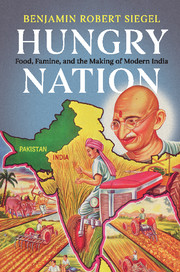Book contents
- Hungry Nation
- Hungry Nation
- Copyright page
- Contents
- Figures
- Acknowledgments
- Introduction
- 1 The Bengal Famine and the Nationalist Case for Food
- 2 Independent India of Plenty
- 3 Self-Help Which Ennobles a Nation
- 4 The Common Hunger of the Country: Merchants and Markets in Plenty and Want
- 5 All the Disabilities Which Peasant and Land Can Suffer
- 6 The Ideological Origins of the Green Revolution
- Conclusion: Landscapes of Hunger in Contemporary India
- Select Bibliography
- Index
3 - Self-Help Which Ennobles a Nation
Published online by Cambridge University Press: 20 April 2018
- Hungry Nation
- Hungry Nation
- Copyright page
- Contents
- Figures
- Acknowledgments
- Introduction
- 1 The Bengal Famine and the Nationalist Case for Food
- 2 Independent India of Plenty
- 3 Self-Help Which Ennobles a Nation
- 4 The Common Hunger of the Country: Merchants and Markets in Plenty and Want
- 5 All the Disabilities Which Peasant and Land Can Suffer
- 6 The Ideological Origins of the Green Revolution
- Conclusion: Landscapes of Hunger in Contemporary India
- Select Bibliography
- Index
Summary
- Type
- Chapter
- Information
- Hungry NationFood, Famine, and the Making of Modern India, pp. 86 - 118Publisher: Cambridge University PressPrint publication year: 2018



